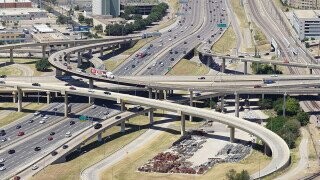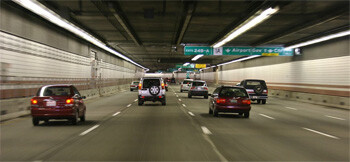4 Ways US Highways Were Designed To Screw Over Black Americans

When Pete Buttigieg recently said that racism was "physically built" into highways of all things, some wiseacres chirped up and said, "Pete, you're the Transportation Secretary, you're supposed to like highways. This was the dumbest gaffe since future Secretary of Energy Rick Perry forgot that the Department of Energy exists."
But those people were wrong. Even if you first heard about it from someone who is clearly a synthetic meatborg built at a CIA black site, many American highways were in fact physically built thanks to racism.
Highways Were Designed To Separate Blacks From Whites
The past couple decades, there's been some talk about building a wall across America's southern border. There are a lot of reasons not to do this. It'd be expensive, and destructive, and ugly, and would mean seizing a lot of land from private citizens. It might even be giant monument to hateful ideas. On the other hand, the government's supposed to secure the border, with or without a wall, so building one isn't a totally absurd idea. So, let's say we don't debate building the wall across a national border. Let's say we instead build it in the middle of your city. Because that what happens when a city builds a highway.
Highways are very good at connecting cars from one end to the other, but they're also very good at blocking people going from one side to another. And quite a few times in the '40s and '50s, city planners laid highways down to separate people -- to precisely separate Black neighborhoods from white ones.

You have, for example, St. Louis, where I-70 ended up limiting how far Black residents could move. Or Atlanta, where I-20 separated Black neighborhoods to the north from white ones to the south. Or Birmingham, where Interstates 59 and 65 separated white neighborhoods like College Hills and Fountain Heights from Black ones like Enon Ridge.
If these boundaries were pure chance, we could still call the highways racist. Racist in consequence, if not in intent, and consequence is what matters, since we really don't care about the moral culpability of asphalt. But this wasn't chance at all -- planners chose these locations deliberately.
Earlier, cities had enforced segregation in various ways. They'd pass laws saying where Black residents could live, or they'd make homeowners enter into covenants restricting who they could sell to. When these policies were struck down as unconstitutional, some cities turned to highways. They built these along the exact same routes as the boundaries they were no longer allowed to enforce. This wasn't a secret: The federal government recommended highways as a segregation tool, in writing.
Though, getting cut off from the white part of town could actually be one of the milder consequences of getting a new highway ...
They Gave Cities An Excuse To Raze Black Neighborhoods
Highways are big. They take up space. That's not really a problem when you're paving the wilderness to connect distant cities, but it really is a problem if you need to lay that road down in a city already filled with buildings and people. Unless you want to destroy big sections of your city, in which case it's definitely not a problem. It's a great opportunity.
Cities seized land from minorities to clear way for highways, and once again, if this was a total coincidence, that would still be bad. If cities planned to build highways through Black and white neighborhoods, then everyone complained, and cities bowed only to white complaints (as happened in Los Angeles, leading to the city's terrible traffic today), that would be bad. But worse than either of those, a lot of cities wanted to get rid of Black neighborhoods.
They saw the Black neighborhoods as diseased organs to be excised. Highway projects provided both the legal justification for destroying undesirable neighborhoods and the funding, since the federal government offered to pay 90 percent of the costs. The process was dubbed "white roads through black bedrooms."

Cities called the doomed areas “blighted,” a misleading term that brings to mind abandoned buildings that are already collapsing. That's not what these areas were (inhabited neighborhoods rarely are). A lot of these neighborhoods, the worst thing you could honestly say about them is they were poor, and some of them weren't even that.
So, in Miami, the city labeled Overtown a slum and kicked out 10,000 Black residents so they could build I-95. St. Louis did the same for Mill Creek Valley, expelling 20,000 Black families to build I-64. Nashville built I-40, demolishing six Black churches along with dozens of apartment buildings and hundreds of houses. Similar stuff went on with Jackson Ward in Richmond and Black Bottom in Detroit and the 15th Ward in Syracuse and Sugar Hill in Los Angeles and in Milwaukee, Pittsburgh, Cincinnati, and so many cities we're not even going to name them all.
Shuffling People To Suburbs Wasn't So Great Either
So, highways left a lot of destruction in their wake. But it was in pursuit of efficiently moving cars, and that was a noble goal, right? Well, efficiently moving cars to and from the suburbs, so rich people can move away ... that was cool for white flight but not so great for the cities they abandoned. Highways segregated districts, but suburbanization segregated vast metropolitan areas. As richer families pulled their tax dollars out of cities, things sucked for those left behind, leaving neighborhoods in worse shape than the supposed slums razed to make the highway.
And suburbanites wanted their towns accessible only via car, rather than through any kind of public transport, to prevent the wrong sort of people from coming. This was a bigger deal in the early days of the highway, when a car was a greater signifier of class, but it continued after that too. Atlanta, for example, has had a mass transit system since 1972 called MARTA (Metropolitan Atlanta Rapid Transit Authority), but for decades, suburbs kept it from expanding into their towns. They wanted the highway to be the only entryway to the suburbs, relegating MARTA to a city-only service, one they dubbed "Moving Africans Rapidly Through Atlanta."

Speaking of making sure the trains don't run on time, no discussion of racism and infrastructure would be complete without a mention of Robert Moses. We've talked about this guy before -- he was responsible for much of New York's design, and he favored highways over public transport, envisioning a far larger highway-based system than the one we ended up with.
Some of the more cartoonishly racist anecdotes about him included his chilling the water in an East Harlem pool to deter Black swimmers and keeping the bridges over his parkway so low that buses (filled with Black passengers) couldn't drive there. For more information on that second story, we liked this dive into it, which concluded Moses might not have been quite as racist as people thought ... but the bridge story, yeah, that's accurate.

So What Now? Destroy All Highways?
One write-up about highways that came out last year provocatively suggested we bulldoze Los Angeles' highways, just as we take down Confederate Monuments, since both are racist. Well, that had to be a tongue-in-cheek suggestion, right? Removing highways now (or waiting till Transformers or Avengers destroy them the next time they fight) won't bring back the homes demolished to make them, and anyway, we kind of need those roads.
But as decades pass, highways reach the end of their lifespans. We'll have to spend billions to rebuild them (beyond the billons we spend anyway to maintain them; America spends $100 billion on this annually, more than most countries' GDP). Or ... we can spend billions to build something else. Perhaps replacing highways with parks and boulevards. Or sticking the highways underground.

That's what Boston did. They moved the central artery of I-93 underground, making it so you can walk freely and safely from one end of the city to the other unimpeded. The project took a decade more than planned, and cost four times what was budgeted, so it might not be a model of how to do things, but it shows what's possible.
Austin has a plan to do something similar with the much-hated I-35. Milwaukee tore down a highway with a shady history, to good results. New Haven's working on getting rid of a highway that displaced thousands when it was constructed in the '50s. Syracuse and Nashville are also debating teardowns. Three decades ago, San Francisco rejected a proposal to demolish their own ugly highway, but then a giant earthquake did it for them, and the city was better for it.
Of course, maybe all highways will become irrelevant once we get those flying cars we were promised. Or once all travel is eliminated and we are confined to our homes permanently. Who knows what the future will bring?
Follow Ryan Menezes on Twitter for more stuff no one should see.